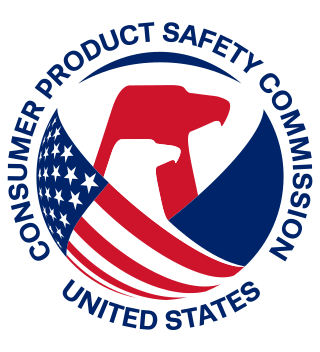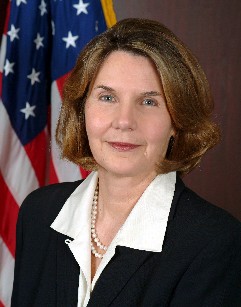Related Research Articles

The United States Food and Drug Administration is a federal agency of the Department of Health and Human Services. The FDA is responsible for protecting and promoting public health through the control and supervision of food safety, tobacco products, caffeine products, dietary supplements, prescription and over-the-counter pharmaceutical drugs (medications), vaccines, biopharmaceuticals, blood transfusions, medical devices, electromagnetic radiation emitting devices (ERED), cosmetics, animal foods & feed and veterinary products.

Cosmetics are composed of mixtures of chemical compounds derived from either natural sources or synthetically created ones. Cosmetics have various purposes, including personal and skin care. They can also be used to conceal blemishes and enhance natural features. Makeup can also add colour to a person's face, or change the appearance of the face entirely to resemble a different person, creature, or object.

Phthalates, or phthalate esters, are esters of phthalic acid. They are mainly used as plasticizers, i.e., substances added to plastics to increase their flexibility, transparency, durability, and longevity. They are used primarily to soften polyvinyl chloride (PVC). Note that while phthalates are usually plasticizers, not all plasticizers are phthalates. The two terms are specific and unique and cannot be used interchangeably.

Methylisothiazolinone, MIT, or MI, is the organic compound with the formula S(CH)2C(O)NCH3. It is a white solid. Isothiazolinones, a class of heterocycles, are used as biocides in numerous personal care products and other industrial applications. MIT and related compounds have attracted much attention for their allergenic properties, e.g. contact dermatitis.

Cosmetology is the study and application of beauty treatment. Branches of specialty include hairstyling, skin care, cosmetics, manicures/pedicures, non-permanent hair removal such as waxing and sugaring, and permanent hair removal processes such as electrology and intense pulsed light (IPL).

ASTM International, formerly known as American Society for Testing and Materials, is a standards organization that develops and publishes voluntary consensus technical international standards for a wide range of materials, products, systems and services. Some 12,575 apply globally. The headquarters is in West Conshohocken, Pennsylvania, about 5 mi (8.0 km) northwest of Philadelphia. It was founded in 1902 as the American Section of the International Association for Testing Materials.

The United States Consumer Product Safety Commission is an independent agency of the United States government. The CPSC seeks to promote the safety of consumer products by addressing "unreasonable risks" of injury ; developing uniform safety standards ; and conducting research into product-related illness and injury. In part due to its small size, the CPSC attempts to coordinate with outside parties—including companies and consumer advocates—to leverage resources and expertise to achieve outcomes that advance consumer safety. The agency was created in 1972 through the Consumer Product Safety Act. The agency reports to Congress and the President; it is not part of any other department or agency in the federal government. The CPSC has five commissioners, who are nominated by the president and confirmed by the Senate for staggered seven-year terms. Historically, the commission was often run by three commissioners or fewer. Since 2009, however, the agency has generally been led by five commissioners, one of whom serves as chairman. The commissioners set policy for the CPSC. The CPSC is headquartered in Bethesda, Maryland.
The American Council on Science and Health (ACSH) is a pro-industry advocacy organization founded in 1978 by Elizabeth Whelan with support from the Scaife Foundation and John M. Olin Foundation. ACSH's publications focus on industry advocacy related to food, nutrition, health, chemicals, pharmaceuticals, biology, biotechnology, infectious disease, and the environment. Its critics have accused it of being a front group for anti-science denialism.
The International Nomenclature of Cosmetic Ingredients (INCI) are the unique identifiers for cosmetic ingredients such as waxes, oils, pigments, and other chemicals that are assigned in accordance with rules established by the Personal Care Products Council (PCPC), previously the Cosmetic, Toiletry, and Fragrance Association (CTFA). INCI names often differ greatly from systematic chemical nomenclature or from more common trivial names and is a mixture of conventional scientific names, Latin and English words. INCI nomenclature conventions "are continually reviewed and modified when necessary to reflect changes in the industry, technology, and new ingredient developments".
Cosmeceuticals are cosmetic products with bioactive ingredients purported to have medical benefits. In the US, there are no legal requirements to prove that these products live up to their claims. The name is a portmanteau of "cosmetics" and "pharmaceuticals". Nutricosmetics are related dietary supplement or food or beverage products with additives that are marketed as having medical benefits that affect appearance.

Bis(2-ethylhexyl) phthalate (di-2-ethylhexyl phthalate, diethylhexyl phthalate, diisooctyl phthalate, DEHP; incorrectly — dioctyl phthalate, DIOP) is an organic compound with the formula C6H4(CO2C8H17)2. DEHP is the most common member of the class of phthalates, which are used as plasticizers. It is the diester of phthalic acid and the branched-chain 2-ethylhexanol. This colorless viscous liquid is soluble in oil, but not in water.

Dibutyl phthalate (DBP) is an organic compound which is commonly used as a plasticizer because of its low toxicity and wide liquid range. With the chemical formula C6H4(CO2C4H9)2, it is a colorless oil, although impurities often render commercial samples yellow.

The Consumer Safety Act (CPSA) was enacted on October 27, 1972, by the United States Congress. The act should not be confused with an earlier Senate Joint Resolution 33 of November 20, 1967, which merely established a temporary National Commission on Product Safety (NCPS), and for only 90-days. Section 4 of the 1972 act established the United States Consumer Product Safety Commission (CPSC) as a permanent independent agency of the United States federal government and defined its basic authority. The act gives CPSC the power to develop safety standards and pursue recalls for products that present unreasonable or substantial risks of injury or death to consumers. It also allows CPSC to ban a product if there is no feasible alternative to an outright ban. CPSC has jurisdiction over more than 15,000 different consumer products. The CPSA excludes from jurisdiction those products that expressly lie in another federal agency's jurisdiction, for example food, drugs, cosmetics, medical devices, tobacco products, firearms and ammunition, motor vehicles, pesticides, aircraft, and boats. These products may fall under the purview of agencies such as the U.S. Food and Drug Administration, the U.S. Bureau of Alcohol, Tobacco, Firearms and Explosives, the U.S. Department of Agriculture, the U.S. Department of Transportation, the U.S. Environment Protection Agency, and the U.S. Federal Aviation Administration.

Nancy Ann Nord is an American former commissioner of the United States Consumer Product Safety Commission (CPSC). She served alongside Hal Stratton, Anne Northup, and Ann Marie Buerkle.

Toy safety is the practice of ensuring that toys, especially those made for children, are safe, usually through the application of set safety standards. In many countries, commercial toys must be able to pass safety tests in order to be sold. In the U.S., some toys must meet national standards, while other toys may not have to meet a defined safety standard. In countries where standards exist, they exist in order to prevent accidents, but there have still been some high-profile product recalls after such problems have occurred. The danger is often not due to faulty design; usage and chance both play a role in injury and death incidents as well.
Green cleaning refers to using cleaning methods and products with environmentally friendly ingredients and procedures which are designed to preserve human health and environmental quality. Green cleaning techniques and products avoid the use of products which contain toxic chemicals, some of which emit volatile organic compounds causing respiratory, dermatological and other conditions. Green cleaning can also describe the way residential and industrial cleaning products are manufactured, packaged and distributed. If the manufacturing process is environmentally friendly and the products are biodegradable, then the term "green" or "eco-friendly" may apply.
The Personal Care Products Council (PCPC) is an American trade association. The PCPC was founded in 1894 as the Manufacturing Perfumers' Association, renamed the American Manufacturers of Toilet Articles (AMTA) in 1922, and renamed again as the Cosmetic, Toiletry, and Fragrance Association (CTFA) in 1970. The current name was adopted in November 2007.

The Consumer Product Safety Improvement Act (CPSIA) of 2008 is a United States law signed on August 14, 2008 by President George W. Bush. The legislative bill was known as HR 4040, sponsored by Congressman Bobby Rush (D-Ill.). On December 19, 2007, the U.S. House approved the bill 407-0. On March 6, 2008, the U.S. Senate approved the bill 79-13. The law—public law 110-314—increases the budget of the Consumer Product Safety Commission (CPSC), imposes new testing and documentation requirements, and sets new acceptable levels of several substances. It imposes new requirements on manufacturers of apparel, shoes, personal care products, accessories and jewelry, home furnishings, bedding, toys, electronics and video games, books, school supplies, educational materials and science kits. The Act also increases fines and specifies jail time for some violations.
Cosmetovigilance is the ongoing and systematic monitoring of the safety of cosmetics in terms of human health. The aim is to detect adverse effects of cosmetic products, and to prevent adverse effects by taking appropriate measures. Regulations for cosmetic products primarily address the safety of products that may be used by large populations of healthy consumers. The identification and analysis of adverse effects related to cosmetic products is a process that is currently still, to a large extent, industry driven. It is the responsibility of manufacturers to determine that products and ingredients are safe before they are marketed, and then to collect reports of adverse reactions.
Women's Voices for the Earth (WVE) is a feminist, women-led, North American environmental organization that specializes in research and advocacy regarding toxic chemicals used in products that disproportionately impact women's health, including cosmetics, menstrual care products, professional salon and cleaning products. WVE is a non-profit organization whose mission is to amplify women's voices to eliminate toxics that harm communities and health. With its inclusive vision of environmental work WVE has become a hub for visionary feminist environmentalism that recognizes the systemic connections between health, class, race, and the environment. Addressing the inter-connectivity of these various channels of exposure to toxic chemicals has been key to WVE's approach which is multi-scalar: targeting consumer behaviors, corporate practices, and government policies.
References
- 1 2 John F. Wasik (May–June 2013). "Beauty Tips for the FDA". The Washington Monthly. Archived from the original on 2016-03-04. Retrieved 2024-06-15.
- ↑ Roberts, Andrea Suozzo, Alec Glassford, Ash Ngu, Brandon (2013-05-09). "Personal Care Products Council, Full Filing - Nonprofit Explorer". ProPublica. Retrieved 2024-06-15.
{{cite web}}: CS1 maint: multiple names: authors list (link) - ↑ GovTrack.us. "H.R. 4040--110th Congress (2007): Consumer Product Safety Improvement Act of 2008, GovTrack.us (database of federal legislation). Retrieved 14 August 2009.
- ↑ California Bans Phthalates In Toys For Children, Bette Hileman, Chemical and Engineering News, October 22, 2007, p. 12.